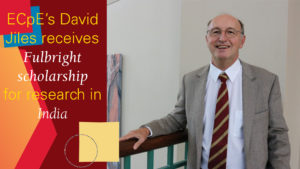
ECpE’s David Jiles receives Fulbright scholarship for research in India
In the Department of Electrical and Computer Engineering (ECpE) at Iowa State University, research is on-going on how to ensure reliability of the power grid. With a secure power grid, people don’t have to worry so much about power failures and black-outs. This is a world-wide problem which has affected the USA for years. For India, the problem is even more acute because of its much larger population and its aging power infrastructure.
David Jiles, Anson Marston Distinguished Professor in ECpE, recently received a scholarship from the Fulbright Program out of the US Department of State in Washington DC. The Fulbright Program promotes research and travel, sending scientists and academics around the globe to meet other scientists and academics and to encourage and grow their new ideas and share them around the world. Jiles received the Fulbright scholarship for research using the internet to monitor Barkhausen emissions coming from steel components within power plants and around electric power grids. The Barkhausen emissions coming from these power systems will be tracked using magnetic sensors, which connect to the internet and inform monitors that could be hundreds of miles away of any unusual emissions that could be indicative of impending problems, particularly as they relate to emerging safety issues.
The proposed project is an outgrowth of his work conducted as a Jefferson Science Fellow with USAID in 2016-17. He will be incorporating some of his earlier work in nondestructive evaluation together with cyber security to better prevent anyone from breaking into power systems for nefarious purposes. With more rugged and remote sensors and non-destructive testing, the national power grids in both countries could be more secure from operational failures or from potential cyber criminals (“hackers”) and therefore cities, factories and homes will be less likely to suffer from unintended power outages.
“The idea is to mesh together the new topic of cyber physical security (CPS) with nondestructive evaluation (NDE). We need rugged sensors to detect problems. There is more established science in non-destructive testing that we can utilize” Jiles said. ”Nuclear systems such as nuclear reactors degrade over time. So what we want to do is to have all of these distributed sensors to continuously monitor and when there is a problem, it will be detected and be corrected sooner.”
The United States power grid typically runs smoothly without any hiccups. But not all power grids around the world can say the same. With this scholarship, Jiles will be traveling to India and working with research partners there to better ensure the reliability of India’s power grid. Jiles heads to India in January 2021, where he will stay for four months working with colleagues whom he knows well from previous research.
“The power grid is much more fragile in countries such as India than it is in the United States because of its larger population and huge power demands in India. So things go wrong on a more regular basis there,” Jiles said. In 2012 the world’s largest power blackout affected over 400 million people in India.
Jiles and other Iowa State University faculty members helped with a massive power outage in Ukraine due to hackers 5 years ago. ISU faculty member Professor Manimaran Govindarasu used ISU’s power grid cyber security testbed and analyzed the December 2015 cyberattack that hijacked and took down substations across western Ukraine.
That cyberattack left some 230,000 Ukrainians without power for up to six hours in the middle of winter. This event inspired the State Department and USAID to work to protect the power grid, not only from its own potential faults, but also from hackers, by leveraging ISU’s cyber security expertise.
Eight electric utility regulators from Ukraine and three other Black Sea countries – Armenia, Georgia and Moldova paid a visit to see what Iowa State’s testbed could show them.
“It had a huge impact on them,” Jiles said. “Seeing what we can do to mitigate these problems was enormously important to them.” Jiles has extensive experience overseas. He was educated in the United Kingdom, earning his doctorate, and has been to India many times. Dr. Jiles is a Fellow of many professional societies, including Fellow of the IEEE, Fellow of the UK Royal Academy of Engineering and Fellow of the Indian Society for Nondestructive Testing.